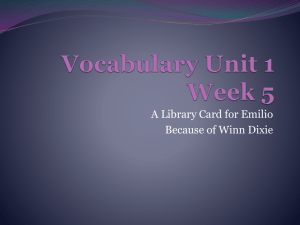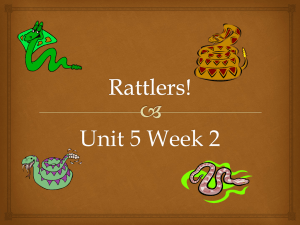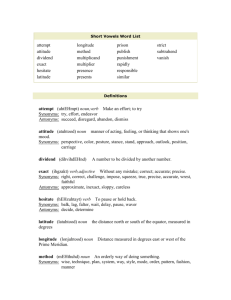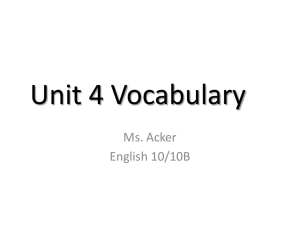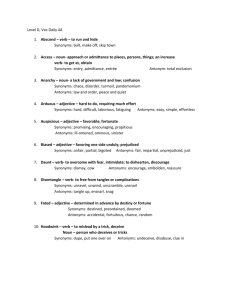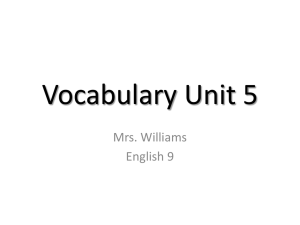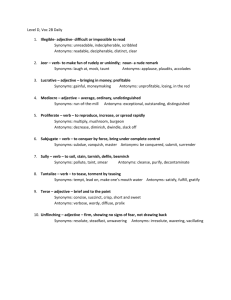Sample Sentences to Introduce Words Initial
advertisement
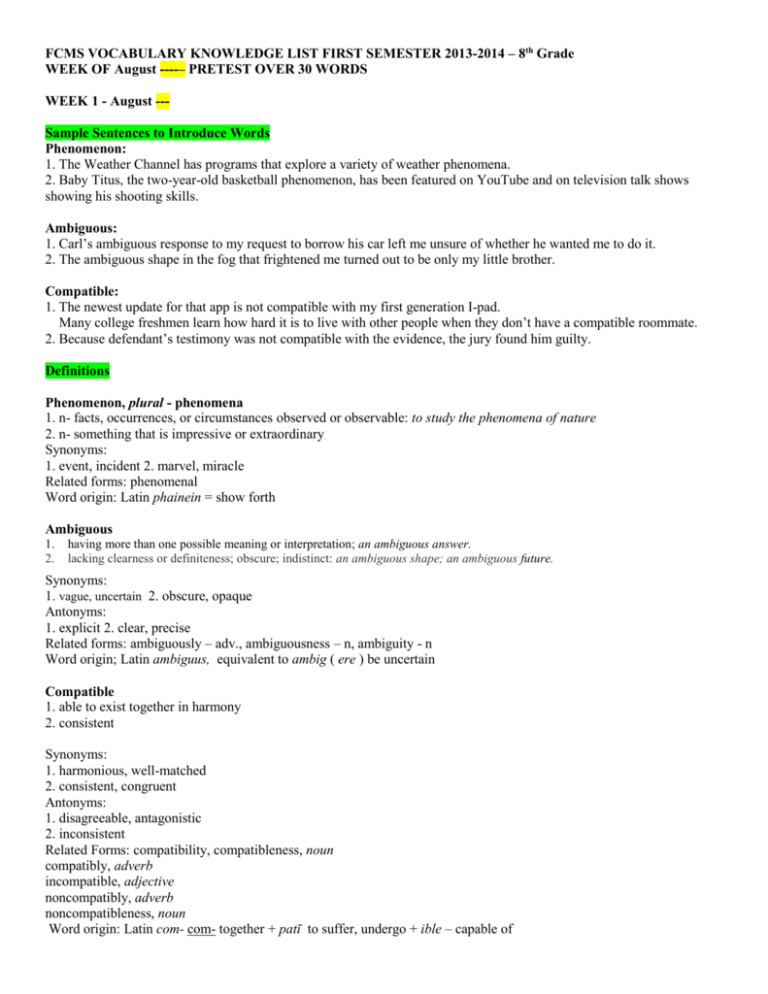
FCMS VOCABULARY KNOWLEDGE LIST FIRST SEMESTER 2013-2014 – 8th Grade WEEK OF August ----– PRETEST OVER 30 WORDS WEEK 1 - August --Sample Sentences to Introduce Words Phenomenon: 1. The Weather Channel has programs that explore a variety of weather phenomena. 2. Baby Titus, the two-year-old basketball phenomenon, has been featured on YouTube and on television talk shows showing his shooting skills. Ambiguous: 1. Carl’s ambiguous response to my request to borrow his car left me unsure of whether he wanted me to do it. 2. The ambiguous shape in the fog that frightened me turned out to be only my little brother. Compatible: 1. The newest update for that app is not compatible with my first generation I-pad. Many college freshmen learn how hard it is to live with other people when they don’t have a compatible roommate. 2. Because defendant’s testimony was not compatible with the evidence, the jury found him guilty. Definitions Phenomenon, plural - phenomena 1. n- facts, occurrences, or circumstances observed or observable: to study the phenomena of nature 2. n- something that is impressive or extraordinary Synonyms: 1. event, incident 2. marvel, miracle Related forms: phenomenal Word origin: Latin phainein = show forth Ambiguous 1. 2. having more than one possible meaning or interpretation; an ambiguous answer. lacking clearness or definiteness; obscure; indistinct: an ambiguous shape; an ambiguous future. Synonyms: 1. vague, uncertain 2. obscure, opaque Antonyms: 1. explicit 2. clear, precise Related forms: ambiguously – adv., ambiguousness – n, ambiguity - n Word origin; Latin ambiguus, equivalent to ambig ( ere ) be uncertain Compatible 1. able to exist together in harmony 2. consistent Synonyms: 1. harmonious, well-matched 2. consistent, congruent Antonyms: 1. disagreeable, antagonistic 2. inconsistent Related Forms: compatibility, compatibleness, noun compatibly, adverb incompatible, adjective noncompatibly, adverb noncompatibleness, noun Word origin: Latin com- com- together + patī to suffer, undergo + ible – capable of WEEK 2- --Sample Sentences to Introduce Words Initial 1. The initial step in cooking anything is to read through the entire recipe. 2. Mr. Stevens initialed each page of the contract, and signed his full name at the end. Resolution 1. The judge announced the resolution of the case against the defendant. 2. Mark’s resolution to raise his math grade required him to work hard, but his success was worth it. Proportion 1. A scale model must in proportion to the original object. 2. Use of cell phones for talking and texting while driving has become a problem of huge proportions. Definitions Initial 1. adj. - of, pertaining to, or occurring at the beginning; first: the initial step in a process 2. v. -to mark or sign with a beginning letter or the beginning letters of one's name Synonyms: 1. first, fundamental, primary, opening Resolution 1. n- a formal decision, judgment, verdict 2. n. firmness of purpose; determination Synonyms: 1. outcome, ending 2. strong will Antonyms: 2. compliance, indecision, weakness Proportion 1. comparative relation between things or magnitudes as to size, quantity, number, etc.; ratio. 2. n- size or dimension: a problem of huge proportions Synonyms: 1. relationship, similarity 2. dimension WEEK 3 - -----Sample Sentences to Introduce Words Principal 1. The principal reason for Larry’s move to Chicago was his job. 2. Cathy’s cousin was a principal in the ballet company. Arbitrary 1. After we had planned to go shopping together, my friend made an arbitrary decision to go to the movies with someone else. 2. Hitler’s arbitrary government quickly eliminated all opposition. Inquiry 1. In their research projects, the students conducted inquiries into a favorite science topic. 2. The detective conducted a formal inquiry into the doctor’s unexplained disappearance. Definitions Principal 1. adj. - first, highest, or foremost in importance, rank, worth, or degree; chief 2. n. - a main participant in a situation Synonyms: 1. primary, main 2. chief, leader Antonyms: 1. unimportant, secondary 2. subordinate Related forms: principally adv.; principality noun Word origin: Latin principalis = first Arbitrary 1. adj. subject to individual will or judgment without restriction 2. adj. having unlimited power; uncontrolled or unrestricted by law; despotic; tyrannical Synonyms: 1. willful, discretionary 2. dictatorial Antonyms: 1. reasonable, rational 2. democratic Related forms: arbitrarily- adv., arbitrariness – noun, Word origin: from L. arbitrarius "depending on the will, uncertain," Inquiry 1. n- a search or request for truth, information, or knowledge 2. n- an investigation, as into an incident: a Congressional inquiry into the bribery charges Synonyms: 1. question, request, interrogation 2. probe, analysis, hearing Antonyms: 1. answer, reply Related forms: inquire verb, inquisition noun inquiring adj. Word origin: Latin in = into; quaerere = ask WEEK 4 – _____ Sample Sentences to Introduce Words Potential 1. Before deciding on which college to attend, Julie examined the potential benefits of attending each one. 2. With his knowledge of sports and his deep voice, Jason had the potential to become a first rate sportscaster. Subsequent 1. Subsequent to their arrival in Chicago, they bought a new car. Conjecture 1. Until the results of the medical tests were in, the doctor could only offer a conjecture about my father’s illness. Definitions Potential 1. adj.- possible, but not yet actual: the potential uses of nuclear energy 2. n- an ability that may or may not be developed Synonyms: 1. latent, likely 2. promise Antonyms: 1. impossible, unpromising Related forms: potentially adjective Word origin: L.L. potentialis "potential," from L. potentia "power" Subsequent 1. adj.- occurring or coming later or after: subsequent events; Synonyms: 1. following, succeeding, consequent Antonyms: 1. preceding, initial Related forms: subsequently adverb Word origin: Latin sub from under + sequi = follow Conjecture 1. n. - a conclusion reached by guessing Synonym: 1. guess, surmise, speculation Antonym: 1. fact, truth, reality Related forms: conjectured, conjecturing verb Word origin: Latin conjicere = discuss, throw together WEEK 5 - SEPTEMBER --- Sample Sentences to Introduce Words Figurative 1. Eighth grade students are expected to recognize a metaphor as an example of figurative language. Function 1. As the manager of the project, Bob’s function was to oversee the work of the all the contractors working for him. 2. If the owner of the company on vacation, Marcy will function in his place. Complement 1. The strawberry shortcake was the perfect complement to our picnic lunch. 2. Mary’s scarf complemented her outfit. Definitions Figurative 1. adj. - of the nature of or involving a figure of speech, esp. a metaphor; metaphorical; not literal: a figurative expression Synonyms: 1. Nonliteral, metaphorical, allegorical Antonyms: 1. literal, exact Related forms: figuratively adverb; nonfigurative adjective Word origin: Function 1. n.-a specific occupation or role 2. v. to work, act, or perform Synonyms: 1. employment, capacity, purpose, duty, job, role; 2. act, behave, operate Related forms: functional adjective, functionalism noun Word origin: Latin function, - onis, fungi = perform Complement 1. n. - something that fills up, completes, or makes perfect 2. v. - to complete; form a complement to Synonyms: 1. addition, completion 2. To complete, to round out Antonyms: lessening, subtraction Related forms: complementer, noun Word origin: Latin complēmentum something that completes Usage Notes: 1. Complement and supplement both mean to make additions to something. To complement is to provide something felt to be lacking or needed. To supplement is merely to add to. 2. Complement and compliment, which are pronounced alike and originally shared some meanings, have become separate words with entirely different meanings. Compliment is to praise or admire. Week 6 ----Sample Sentences to Introduce Words Primary 1. Jason’s primary concern as a coach was the safety of the players. Cite 1. He cited the Constitution in his defense. 2. The eccentric musician was cited for failure to pay his taxes. Plot 1. My grandfather plowed the plot behind his apartment building so he could plant a garden. 2. The rebels developed a plot to overthrow the government. 3. The thieves plotted to rob the bank over the holiday weekend. Definitions Primary 1. adj. -first or highest in rank or importance; chief; principal Related Forms: prime, primarily Origin: Latin prīmārius = of the first rank Synonyms:. chief, leading, principal Antonyms: secondary, subordinate Cite 1. v. -to refer to or to quote (a passage, book, author, etc.), especially as an authority: 2. v. - to summon officially or authoritatively to appear in court. Related Forms: cited, citation Origin: Latin citare = to cause to move, arouse, summon, urge, call Synonyms: 1. note, quote, refer to, 2. summon Possible Problems: site and sight Note: The list of sources used in a research paper is called a WORKS CITED page. A works cited page may also be called a bibliography. Plot 1. n. -a small piece or area of ground: a garden plot; burial plot. 2. n. -a secret plan or scheme to accomplish some purpose, especially a hostile, unlawful, or evil purpose; or 3. v. meaning to make this plan or scheme Related Forms: plotted, plotting Word origin: Old.English. plot "small piece of ground," of unknown origin. Sense of "ground plan," and thus "map, chart" is 1551; that of "plan, scheme" is 1587, probably by accidental similarity to complot, from Old French complot "combined plan," of unknown origin, perhaps a back-formation from compeloter "to roll into a ball." Synonyms: 1. parcel (of land), area 2. device, maneuver, plan (noun form) 3. devise, maneuver, plan (verb form) Week 7 -----Sample Sentences to Introduce Words Reference 1. The newspaper article about war veterans in our area made a reference to the events of D-Day. 2. Lisa was sure to include a list of references she used for her research paper. Objective 1. At FCMS, our learning objectives are posted, so students know their learning targets for the day. 2. When I asked my friend for an objective opinion on my essay, he read it carefully and explained what he felt was well done and what he thought needed improvement. Subjective 1. Although David asked for his mother’s thoughts about taking a new job in California, he knew that she would have a subjective view since she didn’t want him to move away. Definitions Reference 1. n. -a mention; an allusion 2. n. –a source of information or facts Related Forms: refer, referenced, referencing Origin: Latin referre = to bring back Synonyms: 1. note, allusion 2. resource Objective 1. n- purpose; goal; target 2. adj. - not influenced by personal feelings or prejudice; based on facts Related Forms: objectively, objectiveness Origin: Middle English - something perceived, purpose, objection < Medieval Latin objectum = something thrown down or presented (to the mind) Synonyms: 1. aim, ambition, 2. impartial, unbiased Antonyms: 1. 2. subjective, biased Subjective 1. adj. - emotional; based on inner experience rather than fact, not objective: subjective views Related Forms: nonsubjective, adjective, subjec·tiv·ly, adverb, subjectiveness, noun Origin: Latin subjectus = placed beneath, inferior, open to inspection Synonyms: 1. prejudiced, biased Antonyms: 1. objective, fair, unbiased Week 8 ------- Sample Sentences to Introduce Words Term 1. The President’s term of office is four years. 2. The doctor was able to explain the complex medical terms for my ailment in a language I could understand. Plausible 1. The only plausible explanation for the shredded pillow seemed to point to my dog as the culprit. Interpret 1. In a class discussion, Jason interpreted the character’s motives in a way no one had considered. 2. Critics have applauded how Leonardo Di Caprio chose to interpret the character Jay Gatsby. Definitions Term 1. n. -a limited period of time, such as a term of office, a school term 2. n. -a word or group of words having a particular meaning Related forms: terms, termed Origin: Latin terminus - boundary, limit, end; akin to Greek térmōn = limit Synonyms: 1. period 2. word, label, designation Plausible 1. adj. believable, credible, having an appearance of truth or reason Related Forms: plausibility, noun; plausibly, adverb Origin: Latin plausibilis = deserving applause Synonyms: reasonable, believable Antonyms: improbable, implausible, unlikely Interpret 1. v. -to give or provide the meaning of; explain; 2. v. - to convey or represent the spirit or meaning of (a poem, song, etc) in performance Related Forms: interpretation (n)/interpreter/(n) Origin: Latin interpretari = "explain, expound, understand," Synonyms: 1. clarify 2. depict, portray Week 9 ---- Sample Sentences to Introduce Words Structure 1. Steel beams formed the supporting structure of the building. 2. Margaret structured her essay using the format of Power Writing. Justify 1. In math class, students were required to justify their answers to the story problem in a paragraph. 2. After Tom centered the title, he remembered to left-justify his essay. Relevant 1. The teacher requested that students keep their comments relevant to the topic; they didn’t have time to go off on any tangents. . Definitions Structure 1. n- the arrangement and interrelationship of parts in a construction, such as a building 2. v- to give organization or arrangement to Related forms: infrarstructure, noun; structural, adj.; structurally, adv. Origin: Latin. structura = a fitting together, adjustment, building Synonyms: 1. anatomy, arrangement, makeup 2. build, construct Justify 1. v.-to demonstrate or prove to be just, right, or valid 2. v-In printing, to adjust the spacing with the lines of a document so that the lines end evenly at a straight margin Related Forms: justified, justifying, justification Origin: Lain. justificare = "act justly toward, make just, from justificus - dealing justly, righteous, Note: Meaning "to make exact" (now largely restricted to typesetting) is from 1551. Synonyms: 1. validate, verify Relevant 1. bearing upon or connected with the matter in hand; pertinent: a relevant remark. Related Forms: relevance (n) Origin: Medieval Latin relevant- Latin, present participle of relevāre = to raise, lift up Synonyms: pertinent, applicable, related Antonyms: unsuitable, inappropriate, irrelevant Week 10 --- Sample Sentences to Introduce Words Valid 1. In her persuasive essay, Catherine supported her ideas with valid reasons. 2. The prince had a valid claim to the throne since he was the king’s oldest son. Coherent 1. In order to have a coherent argument, Sophia planned her essay before she began to write. Differentiate 1. It was impossible to differentiate between the identical twins unless they wore different outfits. 2. The young man differentiated himself from the other applicants by writing an honest and original essay. Definitions Valid 1. adj.-sound; just; well-founded: a valid reason 2. adj.-having legal force; effective or binding ex: a valid title Related Forms: validly adv.; validity, validation, validness, noun; validate, verb Origin: Latin validus = strong Synonyms: 1. sound, proven 2. binding Antonyms: invalid, unsound, wrong Coherent 1. adj. -logically connected; consistent: a coherent argument. Related Forms: coherently, adverb; noncoherent, incoherent, adjective Origin: Latin - . from com- "together" + hærere = "to stick" Synonyms: 1. logical, rational, understandable Antonyms: 1. irrational, disorganized Differentiate 1. v. - to perceive or the difference in or between; discriminate 2. v. - to form or mark differently from other such things; distinguish Related Forms: differentiated, undifferentiated, adj.; differentiation, n. Origin: Middle English differren - to distinguish < Middle French differer - to put off, distinguish, Latin differre - to bear apart, put off, delay Synonyms: 1. contrast, distinguish (between) 2. individualize Antonyms: associate, confuse, connect - Post-test TBA

